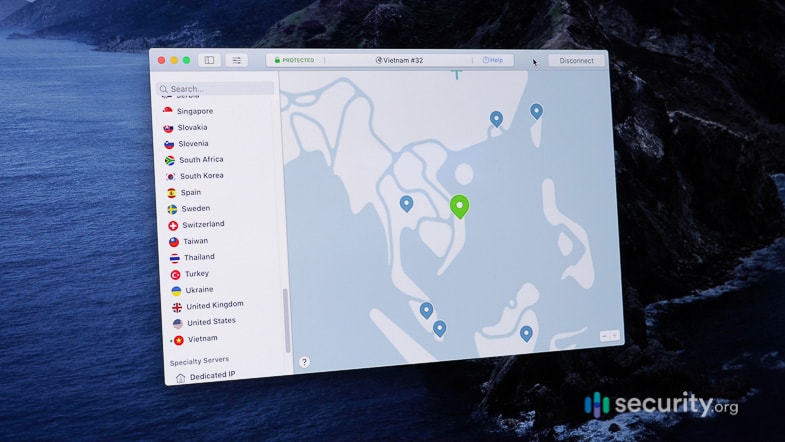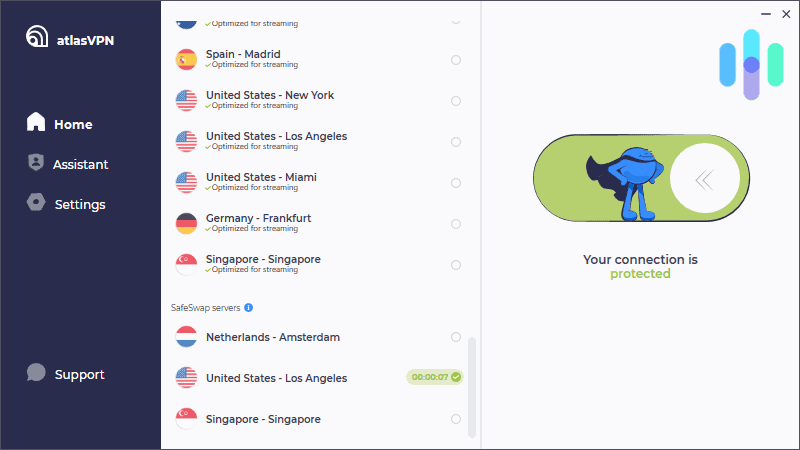Atlas VPN vs. NordVPN
Find out which of these powerhouse VPNs came out on top


 Aliza Vigderman, Senior Editor, Industry Analyst
&
Aliza Vigderman, Senior Editor, Industry Analyst
&
 Gabe Turner, Chief Editor
Last Updated on May 28, 2024
Gabe Turner, Chief Editor
Last Updated on May 28, 2024

- A two-year plan costs just $3.99 per month.
- Each plan comes with a 30-day money-back guarantee.
- Students can receive a 15-percent discount for a two-year plan.

- Affordable subscription options
- Split tunneling available
- Access to streaming services, including Netflix

Editor’s Note: Atlas VPN’s services have now been closed since April 24, 2024, but Atlas’ current customers have been given complimentary NordVPN access for the remainder of their subscriptions. We’re keeping this comparison page up for Atlas customers with subscriptions about to expire who are considering to continue using NordVPN.
This is tricky. As you can see in the note above, Atlas VPN is no more. It was absorbed by NordVPN, following Atlas VPN’s decision that its services had become unsustainable amid the rising technological cost of keeping VPN services up. But Atlas didn’t just abruptly disappear. Existing Atlas customers were given a complimentary NordVPN subscription equal to their remaining plan term with Atlas.
If you were one of those users, you’re probably thinking if you should continue using NordVPN once that complimentary subscription expires. You’re likely most used to Atlas VPN, so why don’t we compare Atlas VPN and NordVPN to give you more insight?
FYI: This page was originally written when Atlas was still offering its VPN services, so the real-life experiences we’ll share below are from when Atlas servers were still up.
Some Key Similarities

NordVPN, much like Atlas, has high standards when it comes to security. That’s to your advantage. As we note in our NordVPN review, NordVPN is among the most secure VPNs on the market. Here’s what that means in concrete terms:
- AES-256: Both Atlas VPN and NordVPN use AES-256 encryption. It’s been estimated that a hacker would need several billion years to crack AES-256 using a brute-force attack. In other words, you can be pretty sure that no one’s going to gain access to your personal data or be able to track your online browsing, at least through a direct assault on either of these VPNs.
- Privacy policy: Of course, all the encryption in the world doesn’t matter if your VPN stores your personal data and is willing to turn that data over to anyone who might ask for it. Luckily, both of these companies operate using a No Logs privacy policy. Now, that phrase is something of a misnomer. All VPNs keep some information about their customers, if only just to keep the VPN operating. No Logs means the VPN collects no information that can be used to track your online activities. Neither of these companies stores your IP addresses, timestamps, or browsing histories. Even if the government shows up with a subpoena, they’ll get nothing from these two, as there’s nothing to get.
- Multihop: NordVPN and Atlas VPN both take advantage of a relatively new VPN technology known as multihop. Any time you engage multihop, these VPNs route your internet connection through at least two separate servers. Each server provides its own AES-256 encryption, and double the encryption means double the protection.
- Kill switch: Finally, even if all these other security measures fail, you’re still protected by these two VPNs’ kill switches. A kill switch shuts down your internet activity any time you lose your VPN connection. As a result, no one can see what you’re up to online, even accidentally.
Did You Know: In a brute-force attack, a hacker uses a computer program to try every possible password until it finds one that works.
As you can read in our Atlas VPN analysis, Atlas shares a number of other features with NordVPN beyond security.
- Split tunneling: We spend part of most days working at the local coffee shop. Our boss doesn’t mind as long as we use a VPN when we’re transferring files to the office. The thing is, if we run our Spotify playlists through the VPN too — and we can’t work without Spotify — it slows the connection down to a crawl. Split tunneling from Atlas VPN and NordVPN helps a ton. It lets us route our sensitive online activities through the VPN, while routing our other online activities through the coffee shop’s Wi-Fi.
- Torrenting: Torrenting is a handy way to get access to unlicensed software, but it definitely raises the risk that someone might track or hack you. It’s no surprise, then, that people who torrent prefer to use a VPN. However, you’ll need a VPN with servers that are configured for P2P sharing. Some of the best torrenting VPN’s, like Atlas VPN and NordVPN, fit the bill.
Some Key Differences

Despite many similarities, these two VPNs aren’t the same. What are the most important differences?
- Protocols: A VPN is an encrypted tunnel to the internet, but encryption alone isn’t enough to secure your online connection. You need a protocol to control how the various types and levels of encryption get deployed. In other words, next to the encryption itself, a VPN’s protocol is the most essential aspect of its operation. Atlas VPN offers WireGuard, an up-and-coming protocol that has developed a reputation for both speed and security. In fact, NordVPN offers WireGuard as well. But NordVPN gives you a choice: you can use WireGuard, or you can use the gold standard in protocols, OpenVPN. OpenVPN isn’t as fast as WireGuard, but it’s been around longer and has been subjected to more testing. We like having that option.
- Servers: The more servers a VPN maintains, the more likely you are to find one with low traffic. The more locations those servers are in, the more likely you are to find one near where you are. Both factors influence VPN speed. Atlas VPN has over 1,000 servers in around 50 different countries. That’s pretty good. NordVPN has over 5,500 servers in more than 60 different countries. That’s better.
- Camouflage mode: NordVPN offers what it calls obfuscated servers. These servers not only conceal your IP address, but they also conceal the fact that you’re using a VPN at all. Here’s why that matters: many streaming services these days will block you if they think you’re using a VPN. Camouflage mode prevents that. As a result, NordVPN provides flawless connections to all the best streaming services, including Netflix, Hulu, and Disney Plus. That explains why it’s at the top of our list of best VPNs for streaming. While we were able to connect to streaming services through Atlas, those connections were spotty because Atlas doesn’t offer camouflage mode.
- MultiHop Plus: Here’s a category in which Atlas VPN comes out on top. NordVPN offers multihop, as we mentioned before. So does Atlas VPN. But Atlas offers something called MultiHop Plus. What’s the Plus all about? First, it optimizes your hopping, so you’ll always get the fastest speeds and the lowest latency. Second, it randomly rotates your servers, making it even harder for hackers to follow your movements.
- Rotating IP addresses: Atlas also employs rotating IP addresses for the same reason. If your IP address changes at regular intervals, no one can associate your address with any particular online activity.
- Unlimited simultaneous connections: Finally, Atlas also offers an unlimited number of simultaneous connections. That means you can install the software on as many devices as you want and use the VPN on all of them at the same time. NordVPN limits users to six simultaneous connections.
FYI: WireGuard and OpenVPN are both open-source software, so the online community has had a chance to test them. However, OpenVPN has been around since 2001, while WireGuard was introduced in 2015.
Pricing
Now, you may have noticed there’s not a lot of difference between these two VPNs. Both provide solid security. Both come with some excellent bonus features. And, while they differ from one another, each offers some excellent features that the other VPN doesn’t offer.
Perhaps price is the difference.
Right away, we should point out that Atlas VPN offers a free version. In fact, Atlas VPN began life as freemium software and has only recently begun offering paid subscriptions. And that free version is pretty darned good. It provides access to three servers with no speed limits, and data is capped at a very generous 5 GB per day. Plus, there are no ads, and Atlas never collects information related to your online activities. With all of those features, it’s no wonder that Atlas VPN ranks high on our list of best free VPNs. NordVPN doesn’t offer a free version of its service.
Here’s the thing, though: a data limit is a data limit — even a 5 GB data limit. So, how does Atlas VPN’s paid service compare price-wise with NordVPN’s?
Price-Per-Month Comparison
| VPNs | 1-month subscription | Annual subscription | 2-year subscription | 3-year subscription |
|---|---|---|---|---|
| NordVPN | $12.99 | $4.99 | $3.79 | n/a |
| Atlas VPN | $11.99 | $4.08 | n/a | $1.83 |
As it turns out, Atlas stacks up pretty well against NordVPN. Atlas doesn’t offer a two-year subscription, but other than that, Atlas actually bests NordVPN in every price category. And that $1.83 per month price you get when you sign up for three years of Atlas is about as good a price as you’ll find anywhere.
Of course, NordVPN’s prices certainly aren’t outrageous, even by comparison. The question, then, is whether the features NordVPN offers are worth a dollar or so more per month.
Recap
If you’re looking for an easy way to conceptualize the differences between these two, you might think of Atlas VPN as NordVPN’s more experimental sibling. That is, Atlas VPN takes a few more chances than NordVPN. Those chances don’t exactly undermine Atlas’s security, but let’s just say that if you want the very best security in the business, that’s still NordVPN. And NordVPN has better streaming options going for it.
The bottom line is that we have to give the edge to NordVPN in this battle. But with these two, you’re probably going to have to make a personal choice. Both provide solid security, both offer great features, and both come with reasonable price tags.
Sign up for NordVPN if you want:
- The added security of the OpenVPN protocol
- Better access to streaming content
- A two-year subscription
Sign up for Atlas VPN if you want:
- Unlimited simultaneous connections
- Rotating IP addresses
- Multihop with randomly rotating servers
Frequently Asked Questions
Before we go, we thought we’d take a little time to answer some of your most frequently asked questions about the differences between Atlas VPN and NordVPN.
-
Is Atlas VPN a good VPN?
Atlas VPN is a good VPN. It provides solid security, with AES-256 encryption, the WireGuard protocol, and the option to use a multihop connection. It offers rotating IP addresses, and its MultiHop Plus feature rotates your server connections regularly to create an added layer of security. An Atlas subscription includes features like split tunneling and access to Netflix, and at $11.99 for a single-month subscription, it’s reasonably priced.
-
Is Atlas VPN owned by NordVPN?
Yes, Atlas VPN is owned by NordVPN. Atlas VPN was founded as a freemium VPN service in 2019. In 2021, Nord Security, the company behind NordVPN, bought Atlas. NordVPN and Atlas VPN operate as separate services run by separate companies.
-
Is Atlas VPN still free?
Yes, Atlas VPN still offers a free version of its VPN. Atlas VPN began as freemium software, providing a secure VPN connection to three different servers, with unlimited speeds and a data limit of 5 GB per day. In recent years, Atlas has introduced a paid service as well. This paid service provides access to over 100 servers and comes with no data limits. A single-month subscription costs $11.99. The per-month price drops to $4.08 if you sign up for one year of service, and to $1.83 if you choose three years. However, Atlas VPN continues to offer its free plan alongside its new paid plan.
-
Does Altas VPN unblock Netflix?
Yes, Atlas VPN does unblock Netflix in some countries. If you’re trying to connect to content libraries in Canada, France, Germany, Italy, Spain, the U.K., or the U.S., you should be able to get through. Currently, however, Netflix is available in 190 countries, the vast majority of which Atlas VPN can’t reliably access.
